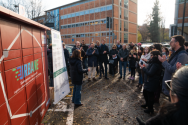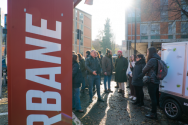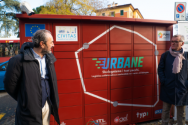- Home
- International relations and projects
- URBANE: Bologna leads innovation in sustainable logistics.
Documenti
URBANE: Bologna leads innovation in sustainable logistics.
On December 12, the Open Innovation Day of Bologna’s Living Lab took place, an event focused on sustainable and collaborative logistics as part of the European project URBANE. The meeting, held at the microhub on Via Calori 17, featured the participation of Valentina Orioli, Bologna's Councillor for Mobility, and was moderated by Paola Cossu, CEO of FIT Consulting and Innovation Manager for URBANE.
During the event, results from a pilot project aimed at redesigning last-mile logistics in alignment with European decarbonization policies were presented. The Bologna model, which involves transferring goods from traditional vans to electric tricycles for distribution within the Limited Traffic Zone, demonstrated the potential to make urban logistics more collaborative and efficient.
Funded by the Horizon Europe program, the URBANE project aims to reduce CO2 emissions by 20% and urban delivery vehicles by 30%, leveraging a scalable system inspired by the Physical Internet concept. In Bologna, three strategically positioned microhubs enable integrated delivery management, fostering collaboration among logistics operators and optimizing the use of public space. This initiative is part of the city’s Sustainable Urban Logistics Plan, contributing to the revitalization of urban and commercial areas.
The pilot project, coordinated by the ITL Foundation, involves several stakeholders, including the Municipality of Bologna, GEL Proximity, Due Torri S.p.A., TYP, and other technological partners like Ricoh and WIB. Additionally, the project is being developed in close collaboration with European cities such as Helsinki, Thessaloniki and Valladolid, with the goal of replicating and adapting the model to different contexts.
Definitively, this initiative marks a significant step toward more sustainable and livable cities, aligning with the objectives of the 2030 Agenda and the European Mission "Smart and Climate-Neutral Cities by 2030."
Ultimo aggiornamento: venerdì 20 dicembre 2024









